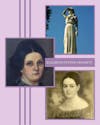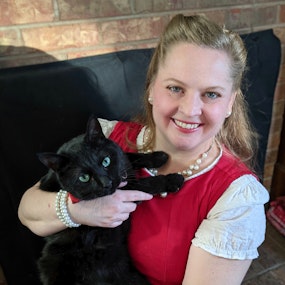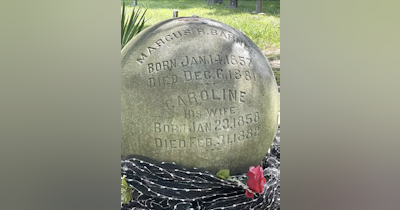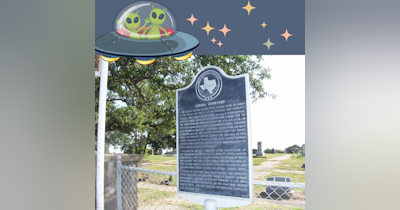Elizabeth Margaret Patton was born to Robert and Rebecca Patton in Swannanoa, North Carolina on May 22, 1788. She was one of the youngest of eight children. Her father was a gentleman farmer with “thousands” of acres of farmland and Elizabeth grew up in comfort. She was a smart girl who learned the ways of farming and as she grew into a young woman it was obvious that she was also savvy at business. Her first marriage was to her first cousin James Patton and they lived in West Tennessee. In 1813 James fought alongside Andrew Jackson and Davy Crockett in the Creek War. He was injured at the Battle of Horseshoe Bend and eventually succumbed to his injuries, dying in 1814 leaving Elizabeth a widow with two young children, George and Margaret Anne. She packed the children up and returned home to North Carolina to live with her parents. Upon his deathbed, James Patton had requested that his friend David Crockett return his personal belongings to Elizabeth. A promise he kept and that was the first time he met the woman who would one day become his second wife. At the time of this first meeting, David’s first wife Polly was still living.
Sadly, on June 11, 1815, Polly died leaving David a widower with 3 young children. As was often the case in that era, David chose to look for a new bride to help care for his family and home. He had been impressed by Elizabeth Patton at their first meeting and began trying to court her. While Elizabeth liked David, she didn’t at first see him as husband material. David did not receive a formal education growing up though he was considered one of the most skilled frontiersmen of his time. Indeed, the celebrated frontiersman had never had much luck with money. Crockett reasoned that as he and Elizabeth “were in the same situation, it might be that we could do something for each other.” He also reasoned that she was a “good industrious woman,” and her “snug little farm,” which Elizabeth herself owned, as well as her rumored personal savings of $800 would “better not only his present condition but also…bode well for his future prospects and those of his children.” However, after several months of persistence Elizabeth agreed to marry him and they were wed sometime in 1815.
As Elizabeth suspected, being married to Davy Crockett was not easy. He was not a man who was content to stay at home and farm. He was often away leaving Elizabeth to tend to the farm along with help from their children. Over the course of their marriage, Elizabeth would give birth to 3 more children. Hunting, exploring, and politics kept David away from home for long periods at a time, leaving Elizabeth to manage the combined eight children, the household, and the family’s business, which included a mill and distillery. Elizabeth’s strength and intelligence were known, and “she knew more about the operation of the mill and the family finances than her husband,” and “always was grinding or lugging sacks of grain with ease” until the mill was destroyed by a flood in 1821.
When David was at home the couple often fought. According to accounts, Elizabeth was extremely religious and wanted her husband to be more involved in church life, but he disagreed. By 1832 Elizabeth had had enough. Divorce was not really an option at that time, but Elizabeth decided to take the younger children and move back to her family in South Carolina. Crockett headed to Texas. Upon his arrival in Texas, Crockett was said to have remarked of Elizabeth and his children, “I have set them free — set them free. They must shift for themselves.”
We don’t really know much about what Elizabeth was doing during this time as she did not leave any journals or records that would tell us more. However, we do know what Davy Crockett was doing. Between 1827 and 1839 Crockett served off and on in the U.S. Congress. While in Congress, Crockett made a name for himself as a gifted storyteller and the “gentleman from the cane,” a snobbish reference to his rural upbringing. He also became the subject of a play and a series of books and almanacs which included tall tales about his exploits as a bear-hunting frontiersman. Hoping to set the record straight about the reality of his life and change his folk hero reputation, Crockett wrote an autobiography and went on tour promoting it. When he returned and lost his seat in Congress, he famously said, “I told the people of my district that I would serve them faithfully as I had done; but if not, they might go to hell, and I will go to Texas.” And he did.
Crockett had proclaimed Texas “the garden spot of the world.” He said he intended to settle in the northern part of Texas and “am in hopes of making a fortune for myself and family as has been my prospects.” However, just eight weeks later after writing these words to his children in a letter, Davy Crockett would be participating in a battle that would end his life. The battle of the Alamo. It happened on the morning of March 6, 1836. Historians continue to debate whether the former U.S. Congressman from Tennessee went down in the heat of battle swinging his trusty rifle “Old Betsy” or faced summary execution after surrendering to the Mexicans who had besieged the old mission for 13 days. Elizabeth Patton Crockett was once more a widow. At this point she was once more living in Tennessee. Even though her marriage to Crockett had been less than ideal, she had maintained close relationships to her 3 stepchildren.
After Crockett’s death, David and Elizabeth’s oldest son Robert went to Texas to continue to fight in the Texas War for Independence. He served for a year in the army of the Republic of Texas and claimed his father’s bounty certificate in April 1838. The Texas national government had awarded 640 acres of land to all men who had fought in the war for independence from Mexico. In 1854 Elizabeth traveled to Texas with her sons George and Robert and one of her daughters named Rebecca, to claim the land. We know that the group had to spend nearly a year near Waxahatchie before finding a land surveyor to take their claim and convert it to real land somehow. When this was finally done in Austin, they found that the 640 acres was shrunk to 320 – the cost of the survey. Since land was selling for a dollar or two per acre in the area, the survey cost was probably reasonable considering the dangers of Indian intervention. The grant they moved to was about 4 miles north of a growing trading post now called Acton, east of the Brazos river on Rucker’s creek. The land was more suited for rangeland than for cultivation; nevertheless Elizabeth set about making a new home.
Elizabeth spent the last six years of her life living in a log cabin on the vast plains of Texas. Even as she was aging, she insisted on doing her share of the farmwork. It was tough work. Many of the comforts she was used to were lacking in this new settlement, but she was determined to make a success of her new home and never complained about the hardships. She was not one to be idle or let others do for her what she could do for herself. Elizabeth Crockett died after an early morning walk from her cabin, at age 72 on January 31, 1860. She was laid to rest in a family plot in the Acton Cemetery.
In 1911, the Texas Legislature approved the creation of a monument to mark the gravesite. A 28-foot tall monument with a statue of Elizabeth Crockett on top. It was installed in 1913. The plot is surrounded by an iron fence and marked by an obelisk topped by a statue of Elizabeth herself. The statue is dressed in a long dress and apron and she’s wearing a bonnet on her head. She is shading her eyes with one hand as she faces the west, perhaps looking to see what more there is in the world or perhaps she is looking for her husband, David (better known as Davy) Crockett to return to her from the war. The middle of the obelisk shows a carving of wheat below which are the words, “Wife of David Crockett”. The base of the obelisk is inscribed with the name “Crockett.” Covering Elizabeth’s grave is a long granite monument with the following inscription, “Mrs. Elizabeth Crockett wife of David Crockett Born in Buncomb County, North Carolina, May 22, 1788 - Married to David Crockett in Lawrence County, Tennessee 1815 - Died in Johnson County, now Hood County, January 31, 1860, age 72 years.
Now known as the Acton State Historic Site, Elizabeth’s grave was once the smallest state park in Texas before stewardship of the site was passed from the Texas Parks and Wildlife Department to the Texas Historical Commission.
(Images available on the Internet and included in accordance with Title 17 U.S.C. Section 107)
















